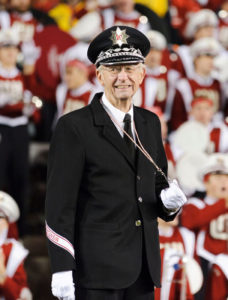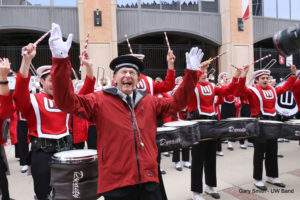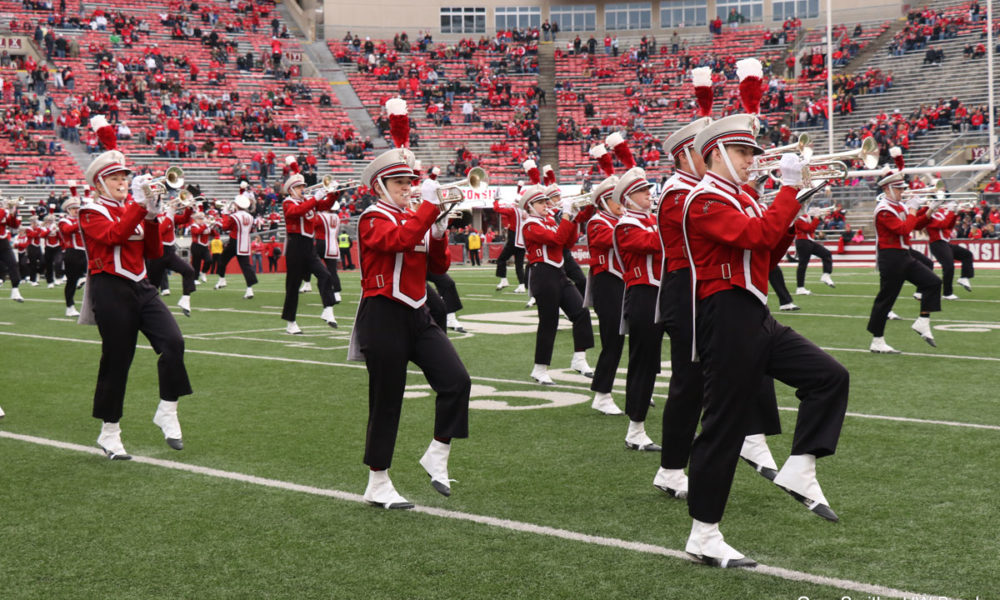 Badger Band Director Michael Leckrone shares his view from “the top” through half a century of transformation, innovation, and fun.
Badger Band Director Michael Leckrone shares his view from “the top” through half a century of transformation, innovation, and fun.
Going into his 50th and final year with the University of Wisconsin-Madison (UW), Director of Bands and marching band director Michael Leckrone looks at how the band has changed and grown—from less than 100 members in 1969 to 315 in 2018.
Halftime: What is your musical background?
Leckrone: I got a [bachelor’s] degree from Butler University in 1958 and a master’s from there in 1961. I stayed on as a teaching assistant and ultimately became the assistant band director. After that, I came to the University of Wisconsin in 1969.
Halftime: What was the program like when you first arrived in Madison, Wisconsin?
Leckrone: It was in a downward mode for a lot of reasons. I was the third director in three years, so any sense of continuity was lost. The football team hadn’t won a game in 24 different tries and was probably at an all-time low. The numbers in the band were just more than 90 people, which is relatively small for a Big 10 marching band. Also, and I say this half-jokingly, the social situation at the time … [had] a lot of anti-war feelings. … It was very difficult to change the profile and interest. That was part of the challenge, and I knew what I was getting into.
Halftime: How much has this program changed since then?
Leckrone: It’s changed enormously in the numbers. We had about 90 marching when I started, and now we dress around 300. We have endowments that have been bestowed …, making funding a whole lot easier. The elevation of the athletic department, not just football but also our basketball and hockey programs, has kept the band very, very active.
Halftime: What are some traditions that make Wisconsin’s band unique?
Leckrone: One of the things I have tried to achieve in the band is called the “Fifth Quarter.” It’s a time when most bands would do a post-game show. … When I first got here, I felt there needed to be a fun, festive atmosphere. … Instead of standing and playing, we started [offering] audience participation. It started with the band playing a polka, doing the polka, and trying to get the members of the audience to do the same thing. As all of this caught on, the fans started putting in more audience participation things to the point where we had a half an hour or more of those kind of fun things we can do.
Halftime: One thing that is exclusive to the band is the “Stop at the Top” marching style. What exactly is that?
Leckrone: It’s the style of marching that we’ve done. If we go back about 50 years, every band particularly in the Big 10 marched high step. In some areas you might call it “the Big 10 Style.” … I put a slight hesitation at the top of that step before bringing it back down. The slight hesitation added a great deal of energy to the look of the band. Putting those things together, that “stop at the top” became something I could use as a watchword for the students.
Halftime: You have taken the band to the Rose Bowl game six times. How is the experience being in that environment so many times?
Leckrone: It truly is indescribable. It’s very intense, and in an event like the Rose Bowl—I know I’ve been there six times—but every day of the week is filled with some great, new experience. We marched in the parade, Knott’s Berry Farm, and Disneyland. The crowds that come are so full Wisconsin that no matter where we appear, we have an audience that’s 100 percent supportive of what we’re doing. It’s like being a rock star there for a few days.
Halftime: A few years ago, you had bypass surgery. How did you overcome that and continue leading the band?
Leckrone: I had bypass surgery to avoid the trauma of having a heart attack; however, the trauma of bypass surgery is still a trauma. I’ve always felt like I’ve been in pretty good health, and I have kept myself in pretty good shape. Basically, all I did was follow the doctor’s orders. … It became a personal challenge to come back and do what I did before. Three years after the surgery, I feel really good where I am.
Halftime: In your time with the Wisconsin band, what has been your proudest moment?
Leckrone: One of the things that gives me the greatest sense of gratification is watching these kids come in right out of high school, not really knowing what they’re getting into, and seeing them turn into knowledgeable leaders. Since I’ve announced I’ve been retiring, I’ve gotten letters from people all over the country from 30, 40 years ago. … They tell me their band experience taught them a lot of life lessons that they are using in the business and social world. The fact that [my] job involved getting people ready to accept responsibility has been so great. It hasn’t just been one moment; it’s been a series of moments.
Halftime: What are your plans for retirement?
Leckrone: It’s a little daunting right now to think about it. I’ve kept myself very active, and I’m really doing so now. I think when it comes to an end, in a quick hurry, I’ll have to stop and reevaluate. I certainly think there will be some travel involved, but I have no long-term plans as to what I’ll be doing. I’m hoping in the next coming months that I would be able to guest conduct a band or a clinic.
Halftime: What is your advice for directors?
Leckrone: You can’t look for ways to not work hard. You have to be able to make that commitment into what you are doing. Most of the young directors I know understand that it’s not an easy job. It takes that commitment to spend that extra time with the students.
Halftime: What is your advice for students?
Leckrone: Prepare yourself. Study [as] many different things as you can. There’s always a tendency to go with what you know, and I’ve always looked for a different way to do it. Don’t be afraid to experiment and try things that people may say, “I don’t think you can do that.” One of the things I pride myself on is when people doubt me, I take that as a challenge.


